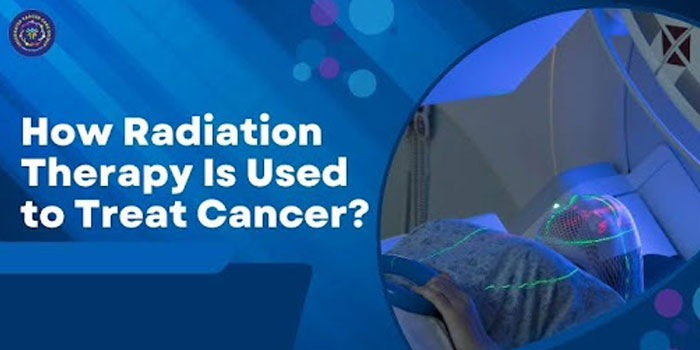Introduction
Cancer is a complex and multifaceted disease that requires a comprehensive approach for effective treatment. Among the various options available, radiation therapy stands out as a cornerstone in the battle against cancer. This blog delves into the intricacies of radiation therapy, exploring how it works, its applications, benefits, and potential side effects.
What is Radiation Therapy?
Radiation therapy, also known as Radiotherapy, is a medical treatment that uses high doses of radiation to kill cancer cells and shrink tumours. It is a highly effective treatment method, that can be used alone or combined with other treatments like surgery and chemotherapy.
There are two main types of radiation therapy:
External Beam Radiation Therapy (EBRT):
This is the most common form of radiation therapy. It involves directing high-energy radiation beams at the cancerous area, from outside the body.
Internal Radiation Therapy (Brachytherapy):
This method involves placing a radioactive source inside or near the tumour. Brachytherapy is often used for cancers of the cervix, prostate, and breast.
How Does Radiation Therapy Work?
Radiation therapy functions by damaging the DNA of cancer cells, which impairs their ability to reproduce and grow. This targeted approach allows for the destruction of cancer cells while sparing as much of the surrounding healthy tissue as possible. Over time, the damaged cancer cells die off and are naturally eliminated by the body.
Uses of Radiation Therapy in Cancer Treatment
Radiation therapy can be used in various ways to treat cancer:
Primary Treatment:
For some cancers, radiation therapy may be the main treatment. It is often used for cancers of the head, neck, prostate, and lung.
Adjuvant Therapy:
Radiation may be used after surgery or chemotherapy to eliminate any remaining cancer cells and reduce the risk of recurrence.
Palliative Treatment:
In advanced stages of cancer, radiation therapy can help relieve symptoms such as pain and improve the quality of life.
Advantages of Radiation Therapy
One of the significant advantages of radiation therapy is its precision. Modern techniques and technologies, such as intensity-modulated radiation therapy (IMRT) and stereotactic body radiation therapy (SBRT), allow for the highly accurate targeting of tumours. This precision helps minimise damage to surrounding healthy tissues and reduces the likelihood of side effects.
Possible Side Effects and Management
While radiation therapy is generally well-tolerated, it can cause some side effects. Common side effects include fatigue, skin changes, and localised pain. These effects are usually temporary and can be managed with appropriate care and support.
Here are some tips for managing side effects:
Fatigue: Ensure adequate rest, maintain a balanced diet, and engage in light physical activity to boost energy levels.
Skin Changes: Use gentle skin care products, avoid sun exposure, and wear loose-fitting clothes to prevent irritation.
Pain Management: Follow your healthcare provider’s recommendations for pain relief and seek support from specialists if needed.
Radiation therapy is a powerful tool in the fight against cancer. Its ability to precisely target and destroy cancer cells makes it a valuable component of many cancer treatment plans. If you or a loved one is considering radiation therapy for cancer, it is essential to consult with healthcare professionals to understand the best approach for your specific condition.
For those seeking top-notch cancer treatment, ICCG India is equipped with state-of-the-art radiation therapy for cancer technology and a team of experienced oncologists dedicated to providing the highest quality care.







